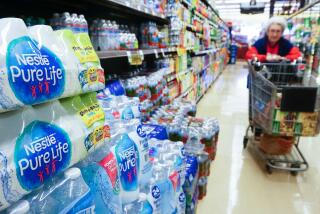Opinion: What does fracking have to do with breast cancer awareness?
It’s October, National Breast Cancer Awareness Month.
That means it’s the Month of the Pink Products. The idea is that if you buy one of those rose-colored items, ranging from pink smartphone cases to pink Cuisinarts to pink-labeled jars of spices on your grocery shelf, the manufacturer will donate part of the profits to fund research for a cure for the devastating disease that mostly targets women. You can buy a pink purse, a pink T-shirt, pink sunglasses, a pink bracelet, a pink-jeweled navel ring, a pink-capped face moisturizer, even a pink-frosted Mardi Gras-style “king cake” from a New Orleans bakery. (The cake is shaped like one of those ubiquitous folded pink ribbons that also mark Breast Cancer Awareness Month.)
And, just as you might expect, October is also the month of the National Harping From the Feminist Left About All Those Pink Products. No sooner does the moon phase into its 10th cycle of the year than the moralizing articles appear in the media about the horror that corporations actually make money selling all that pink merchandise -- and they get free favorable publicity for themselves when they jump onto the breast cancer awareness bandwagon. The idea is that corporations are bad and profits are even worse. So the foes of breast cancer awareness products have given the merchandising practice a name: “pinkwashing.”
The latest supposed pinkwashing scandal revolves around the pink campaign’s association with fracking -- which, as everyone on the left will be happy to inform you, is an unmitigated evil, even though it produces a hell of a lot of oil and natural gas. Baker Hughes, a manufacturer of equipment used in hydraulic fracturing, has painted 1,000 of its drill bits breast-cancer pink (the usual color is gold) and also donated $100,000 to Susan G. Komen Race for the Cure, a leading breast-cancer charity. As Bill Debo, director of operations for U.S. land drill bits at Baker Hughes told the blog Fuel Fix, “Our hope is from the water cooler to the rig site to the coffee shop to everywhere, someone gets this information to their spouses, their girlfriends, their daughters so we can create awareness and end this disease forever.”
The anti-pink crowd launched into its usual mockery. “[W]hat many companies hawking pinkwashed products still don’t seem to understand -- or think we’re too dumb to notice -- is that ‘raising awareness’ about breast cancer does more to raise the company’s profile than actually fight the disease,” wrote Amanda Hess at Slate.
Laura Bassett at the Huffington Post, citing information from the anti-pink advocacy group Breast Cancer Action, wrote, “Fracking operations have been found to use carcinogenic chemicals, and some studies have found increased cancer rates in areas of oil and gas development.”
The anti-pink campaign has long predated Hughes-Baker and fracking, of course. In 2010 medical sociologist Gayle A. Sulik’s book “Pink Ribbon Blues” excoriated what Sulik called “breast cancer culture.” In Sulik’s view, the pink stand mixers and pink Mustangs were only the tip of a commercialized iceberg of useless but expensive mammograms, false-positive biopsies, and aggressively promoted anti-breast cancer drugs such as Tamoxifen. The 2011 movie “Pink Ribbons Inc.” similarly denounced what it viewed as heavy-handed corporate manipulation of the war against breast cancer. In 2009, feminist writer Barbara Ehrenreich, writing for Salon, declared that “pink-ribbon culture has replaced feminism as a focus of female identity and solidarity.” She accused the manufacturers of pink products of donating only a “minuscule” portion of their profits to breast cancer research.
I have this to say: First, I’m a breast cancer survivor. Luckily, it was stage 0, necessitating a lumpectomy plus radiation but no chemo -- and I opted not to take Tamoxifen. Around the time of my surgery a beloved aunt died of breast cancer, and I have two friends who got hit by the disease far harder than I did.
Second, I detest the pink merchandise, too. For starters, there’s the insipid birthday-cake shade of pink -- why not at least give us a sophisticated coral? When I would stagger back from the radiology lab in October 2006, the credit card machine at my neighborhood Safeway would ask me, “Do you want to donate to breast cancer research?” I would think, “Why isn’t breast cancer research donating to me?”
But I can’t fault the companies that make the stuff. Of course there’s an element of self-promotion in all of it, and maybe some tastelessness, too. But I vastly prefer that to the grim humorlessness and anti-corporate haranguing of the anti-pink brigade. And it’s undoubtedly true that many of the people who dream up those campaigns have “spouses, girlfriends and daughters” either hit by or at risk of breast cancer. All of us do. It’s a dreadful scourge that even a corporate CEO doesn’t deserve to die from.
Charlotte Allen writes frequently about feminism, politics and religion. Follow her on Twitter @MeanCharlotte.
Follow the Opinion section on Twitter @latimesopinion
More to Read
A cure for the common opinion
Get thought-provoking perspectives with our weekly newsletter.
You may occasionally receive promotional content from the Los Angeles Times.






